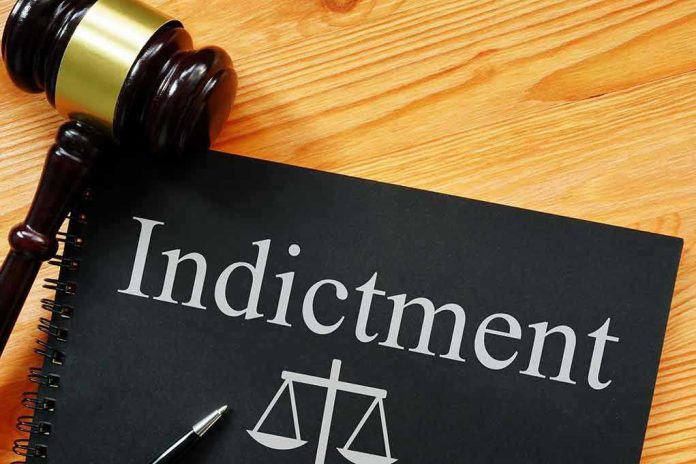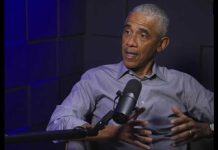
For the first time in modern American history, a former FBI Director stands indicted not only for allegedly lying to Congress but for obstructing the very process designed to hold leaders accountable—an explosive collision of law, politics, and power that is forcing the nation to reconsider where justice ends and vengeance begins.
Story Snapshot
- James Comey, ex-FBI chief, indicted for false statements and obstruction tied to the Russia investigation
- Indictment follows years of political pressure from Donald Trump and his allies
- Prosecution raises grave questions about DOJ independence and the precedent for targeting senior officials
- Public and legal debate intensifies over the weaponization of justice and the future of congressional oversight
Comey in the Crosshairs: The Unprecedented Fall
James Comey’s name once evoked the stoic face of federal law enforcement. Today, it heads court dockets coast to coast. Comey was indicted by a federal grand jury for making false statements to Congress and obstructing a congressional proceeding—allegations rooted in his 2020 testimony about the FBI’s “Crossfire Hurricane” probe into Russian interference in the 2016 election. This is not just another legal headline; it is the first time a senior U.S. law enforcement official faces criminal prosecution over testimony linked to the Russia investigation, a saga that has haunted American politics for nearly a decade.
Comey’s prosecution is a political and legal earthquake. President Donald Trump, who fired Comey in 2017 and has long painted the Russia probe as a partisan “hoax,” openly demanded Comey’s indictment in the days leading up to the charges. Attorney General Pam Bondi—a Trump loyalist—now presides over the Department of Justice, amplifying concerns that the wheels of justice may be grinding to a political rhythm. Public statements from Bondi and new FBI Director Kash Patel underscore a relentless push for “accountability” in what they frame as a betrayal of public trust. Comey’s arraignment is set for October 9 in Alexandria, Virginia, and his legal team signals an all-out defense.
Russia, Retribution, and the Making of an Indictment
The path to Comey’s indictment is paved with intrigue, rivalry, and years of political trench warfare. The FBI’s “Crossfire Hurricane” began in 2016 to investigate Russian meddling in the presidential election—a fact confirmed by multiple government reviews, despite Trump’s relentless claims of a “witch hunt.” Comey’s firing in 2017 was a flashpoint, but the campaign to hold him criminally liable for his handling of the investigation never lost steam. Comey’s 2020 testimony before Congress—now the linchpin of the indictment—came under renewed scrutiny after Trump’s public calls for prosecution and Bondi’s appointment as Attorney General. The timeline is a study in political escalation, culminating in the September 2025 indictment.
Inside the DOJ, the decision to prosecute Comey exposes deep fissures over independence and the boundaries of executive power. Bondi’s supporters argue the case is overdue justice for abuses of power, while critics say it’s a chilling example of weaponizing justice against political adversaries. The stakes are enormous, not only for Comey’s legacy but for the very architecture of congressional oversight and prosecutorial discretion.
The Political Earthquake and Its Aftershocks
The Comey indictment has detonated a fresh round of tribal warfare in Washington. Trump’s allies celebrate the charges as long-awaited retribution, a warning shot to other officials who might “betray” the public trust. Conservative pundits argue the prosecution is overdue, citing years of unanswered questions about the origins and conduct of the Russia probe. Comey’s defenders, meanwhile, cast the indictment as political vengeance, noting Trump’s direct involvement and Bondi’s loyalty as evidence of impropriety. Legal scholars and former DOJ officials voice alarm over the precedent: never before has a senior law enforcement official faced prosecution for statements to Congress about a politically charged investigation.
Public trust in the Department of Justice, already battered by years of partisan crossfire, now faces a new test. The indictment’s short-term impact is to inflame partisan divisions, with each side treating the case as a proxy war for larger questions of justice, accountability, and the rule of law. In the long run, the prosecution could harden a dangerous norm—where each change of administration brings fresh prosecutions of the last regime’s leaders. The chilling effect on law enforcement and intelligence officials, now weighing every word before Congress, may be profound. Congressional oversight, once the bulwark of American checks and balances, risks becoming a minefield for public servants caught in political crossfire.
Sources:
American Press (September 25, 2025)
Fox News Digital (September 25, 2025)



